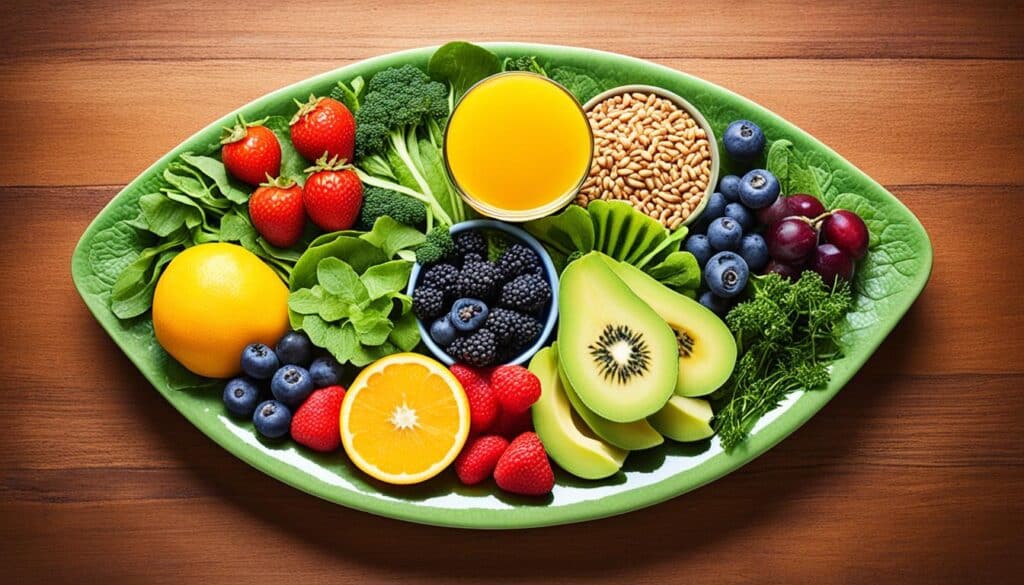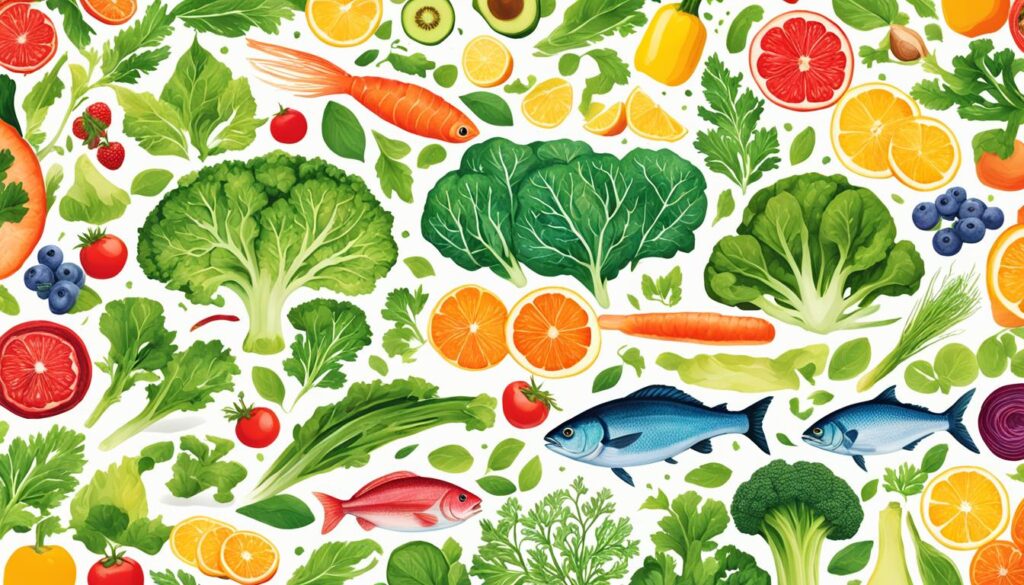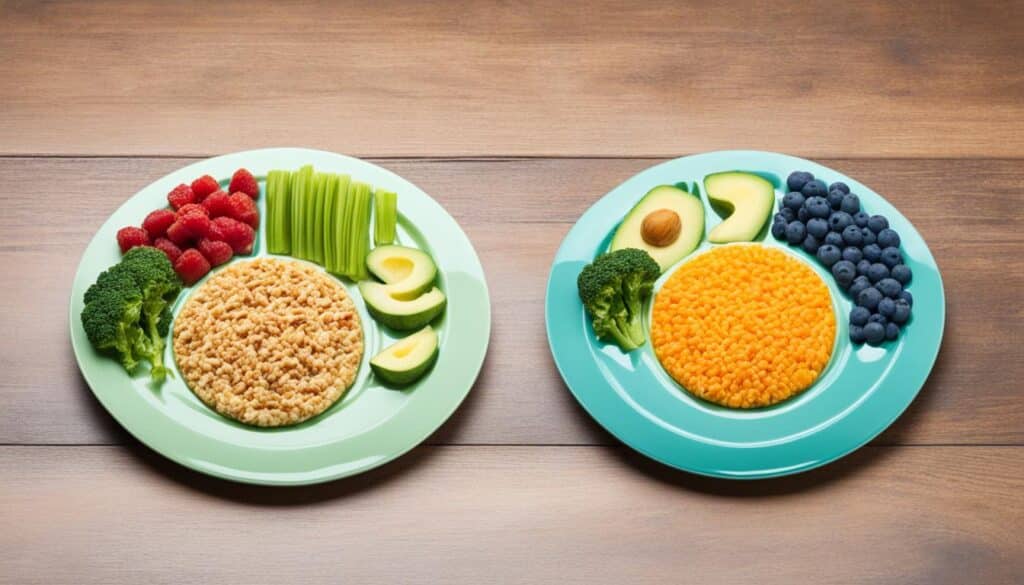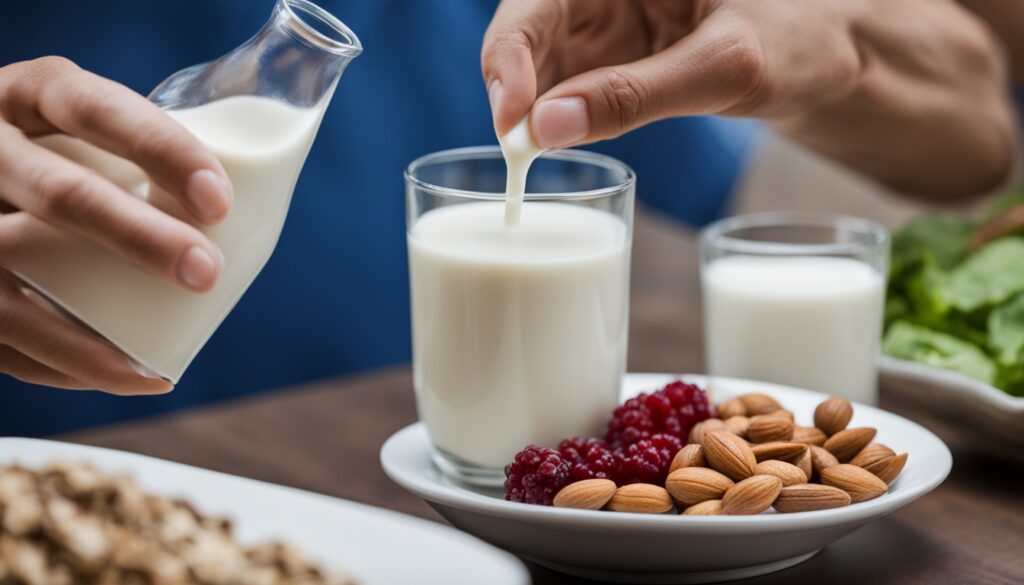Benefits Of A Balanced Diet is key for good health. Choose lots of nutrient-filled foods from each major food group. This can help your heart, lower cancer risk, and prevent type 2 diabetes.
Include whole grains, fruits, vegetables, lean proteins, and healthy fats in your meals. Doing so can make your cholesterol and blood pressure better. It also ups your energy, boosts your immunity, and makes your mind sharper.
Benefits of a good diet reach further than your body. It helps with weight, letting you shed pounds or stay fit without a lot of exercise. Plus, it lowers the chance of heart issues, obesity, and high blood pressure.
Key Takeaways
- A balanced diet provides essential nutrients for optimal health and wellbeing.
- Eating a healthy diet can reduce the risk of heart disease, cancer, and type 2 diabetes.
- Whole grains, fruits and vegetables, lean proteins, and healthy fats should be the foundation of a balanced diet.
- A balanced diet can support weight management, energy levels, and mental health.
- Switching processed foods, sugary and high-salt items for healthier choices is crucial.
What is a Balanced Diet?
A balanced diet includes various nutrient-dense foods from all the major groups. It consists of lean proteins, whole grains, and healthy fats. You’ll also find a lot of fruits and vegetables in this diet. These foods give your body everything it needs: carbs, proteins, fats, vitamins, and minerals.
Essential Nutrients
A balanced diet gives your body important macronutrients like carbs, proteins, and healthy fats. It also provides many vitamins and minerals crucial for health. You need things like calcium, vitamin C, iron, magnesium, and omega-3s for your well-being.
Food Groups
In a balanced diet, be sure to include fruits, veggies, whole grains, and lean proteins. Don’t forget healthy fats like those in olive oil and avocado. By eating different kinds of food, you get a variety of important nutrients.
Healthy Eating Habits
Maintaining a balanced diet means you should have good eating habits. Drink lots of water, cut back on processed foods and sugars, and be active. These steps will keep you healthy and help with weight management.
Promotes Heart Health

A balanced diet is key for a healthy heart. It lowers the chance of heart disease, a top killer in the US. The American Heart Association notes that nearly half of adults in the U.S. have some heart issue.
Reduces Risk of Heart Disease
Eating less saturated fat, trans fat, and sodium helps. This diet lowers bad cholesterol and stops artery plaque. A diet full of fruits, veggies, whole grains, lean meats, and good fats is good for your heart.
Lowers Blood Pressure
A diet that’s low in sodium but has lots of potassium, magnesium, and calcium is best. This helps keep blood pressure in check, avoiding heart issues. Bananas, greens, and fish are great for these minerals.
Dietary Approaches to Stop Hypertension (DASH) Diet
The DASH diet is great for your heart. It focuses on fruits, veggies, whole grains, lean proteins, and low-fat dairy. It proves to lower blood pressure by emphasizing fiber and less saturated fat and sugar.
Reduces Cancer Risk

A balanced diet can lower the chance of getting some cancers. This includes colorectal, liver, and upper gastrointestinal tract cancers. Foods like fruits, vegetables, nuts, and legumes have strong
antioxidants
and
phytochemicals
. They fight off damage from
free radicals
,
which increases the risk of cancer.
Antioxidants and Phytochemicals
Lycopene, beta carotene, vitamin A, vitamin C, and vitamin E stop free radicals. They stop them from harming our cells. Plant foods’ phytochemicals also slow cancer’s growth and help the body’s defenses.
Maintaining a Healthy Weight
Being at a healthy weight is key in reducing cancer risks. Obesity can raise your chance of getting different cancers. Eating a lot of
fruits
,
vegetables
,
nuts
, and
legumes
Improves Mental Health

There’s clear evidence that what we eat affects how we feel. Eating too many sugary and processed foods can make people feel down. This is especially true for those dealing with obesity.
Diet and Mood
Our diet can mess with our mood in strange ways. Some foods are tied to more depression. These include processed foods and red meat.
On the flip side, eating lots of veggies, fruits, and whole grains can lift our spirits. It can also cut down on feeling tired all the time.
Mediterranean Diet
The Mediterranean diet is all about lots of plants, healthy fats, and a bit of protein. It’s been proven to help with mental health. People who follow it have lower chances of feeling depressed and think better too.
This diet is full of good stuff like antioxidants and anti-inflammatory things. These goodies make our brains happy and healthy.
Benefits Of A Balanced Diet

A balanced diet is great for gut health. The colon has helpful bacteria that do a lot. They help with metabolism, digestion, and keeping us healthy. Also, some gut bacteria make needed vitamins like K and B.
Gut Health
Keeping our gut healthy is key. Bad gut bacteria can cause many health issues. These include inflammation, irritable bowel syndrome (IBS), and digestive problems. Eating lots of fiber, vegetables, fruits, legumes, and whole grains supports a healthy gut.
Prebiotics and Probiotics
Along with key nutrients, a balanced diet gives us prebiotics and probiotics. Prebiotics are fibers that good gut bacteria eat. Probiotics are live bacteria and yeasts that help us. Fermented foods like yogurt, kefir, sauerkraut, and kimchi are rich in probiotics. They keep our colon healthy.
Supports Brain Function

Eating well can help your brain work better. Some nutrients and foods are good for your brain and can prevent memory loss and dementia. These include:
Nutrients for Cognitive Health
Omega-3 fatty acids help your brain, and you can find them in fatty fish, nuts, and seeds. B vitamins, like folate, vitamin B6, and vitamin B12, are very important. They keep your brain working well, especially as you get older.
Antioxidants in fruits, vegetables, and whole grains are also key. These help protect your brain from damage by stress and inflammation. This damage can cause memory problems.
The Mediterranean diet is great for brain health. It includes healthy fats, lean proteins, whole grains, fruits, and vegetables. This diet has been linked to lower dementia risk and better memory in older people.
Aids Weight Management

Eating the right mix of foods can help you stay at a healthy weight. Foods like veggies, fruits, and beans are great because they fill you up with fewer calories. This is key for those trying to lose weight or those dealing with obesity.
Calorie Density
The Dietary Guidelines for Americans say eat low-calorie-dense foods for better weight management. These foods, mostly veggies and fruits, make you feel full without lots of calories. So, you can eat less but still feel satisfied.
Fiber and Lean Proteins
Fiber and lean proteins are your friends for weight loss. Things like beans, lentils, and poultry help you feel full. This stops you from eating too much or reaching for unhealthy snacks.
Manages Diabetes

Eating well is key for those dealing with diabetes. A good diet can help with type 2 diabetes by keeping blood glucose, blood pressure, and cholesterol in check. It also supports weight management.
Blood Glucose Control
Picking the right foods is vital for diabetes control. Include fiber and lean proteins in your meals. Steer clear of added sugar, salt, saturated fat, and trans fat.
Go for whole, unprocessed stuff rather than fried foods. This helps keep blood sugar at a safe level.
Preventing Complications
Yes, eating well matters a lot with diabetes. It can slow down, or even stop, troubles like nerve mess, bad kidneys, and blurry sight. Aim to eat lots of fruits, veggies, and healthy proteins. They’re good for your overall health when you’re managing type 2 diabetes.
Builds Strong Bones

Eating right helps your bones stay strong. You need calcium and magnesium. They are vital for building and keeping your bones and teeth healthy. They also fight off osteoporosis, where bones get weak and break easily.
Calcium and Magnesium Sources
Some top sources of calcium are dairy products. Think milk, cheese, and yogurt. Don’t forget about leafy greens like kale and broccoli. Canned fish with bones, like sardines and salmon, are great too. And many foods are boosted with calcium, such as cereals and plant-based milk alternatives.
Magnesium is crucial for bones too. You can get it from nuts, seeds, and whole grains. Adding these to your meals can work wonders for your bone health.
Preventing Osteoporosis
To avoid osteoporosis, eat plenty of calcium and magnesium. It’s especially important as you get older. These minerals keep your bones strong and cut the chance of breaks.
Promotes Better Sleep

A balanced diet can help us sleep better. Too much alcohol and caffeine can mess up our sleep. They might even cause problems like sleep apnea.
Limiting Alcohol and Caffeine
It’s smart to cut back on alcohol and caffeine for better sleep. While alcohol might make us sleepy at first, it makes our sleep worse. Caffeine makes us alert, making it hard to get peaceful sleep.
Choosing wisely about alcohol and caffeine can boost how well we sleep. This helps us feel more energetic and better able to manage fatigue. Eating right and following good sleep practices can do wonders for health.
Establishes Healthy Habits
Choosing a balanced diet is key in setting up good habits for the future. Kids often pick up their health choices from adults. If parents show they enjoy eating healthy and staying active, their kids are likely to do the same.
Modeling for Children
Parents who eat foods like whole grains, fresh produce, and whole fruits are great role models. Their actions show their kids the value of choosing healthy family meals over soft drinks and processed meats.
Small Dietary Changes
Even small diet tweaks matter a lot. Ditch sugary soft drinks for water or herbal tea. Start enjoying more whole grains, fresh produce, and whole fruits. Sub red meat and processed meats for lean proteins. These choices are a good start for a healthier family lifestyle.
Also Read: 10 Healthy Meal Plans For A Balanced Diet
Conclusion
Eating a balanced diet has many pluses for our health and happiness. A diet that mixes in lots of nutrient-packed foods from various groups can be good for our heart. It can also lower chances of getting cancer, boost our mood, help our memory, control our weight, keep diabetes in check, make our bones strong, and help us sleep better.
Getting into the habit of eating well means we show our kids how to do it too. It might be tough at first to change your eating habits a bit. But, even small steps can really change how you feel both physically and mentally.
In the end, eating a lot of whole foods that are barely processed is really smart for our health. Choosing foods high in nutrients and steering clear of too much sugar, salt, and bad fats can set us on the right path. It leads to a future where we’re not just healthier but also full of life and energy.
FAQs
Q: What are the benefits of a balanced diet?
A: A balanced diet can improve your health and wellbeing by providing essential nutrients, reducing the risk of chronic illnesses, and helping you maintain a healthy body weight.
Q: How can a healthy diet benefit your overall health?
A: A healthy diet, rich in fruits and vegetables, whole grains, lean proteins, and low-fat dairy, can help lower the risk of health risks such as obesity, heart disease, and diabetes.
Q: What are some tips for healthy eating?
A: Eating a variety of foods, including plenty of fruits and vegetables, whole grains, and lean proteins, while limiting consumption of high-sugar and high-salt foods, can contribute to a healthy diet.
Q: Why is it important to include milk and dairy foods in your diet?
A: Milk and dairy foods are important sources of calcium and protein, essential for maintaining strong bones and overall health.
Q: How can a balanced diet help you lose weight?
A: A balanced diet, combined with regular physical activity, can help you achieve and maintain a healthy body weight, making it easier to lose weight when needed.
Q: What are pulses and why are they beneficial?
A: Pulses, such as peas and lentils, are plant-based sources of protein and fiber that can help with weight loss, reduce the risk of chronic diseases, and improve overall health.
Q: How does saturated fat impact your health?
A: Consuming too much saturated fat, found in fatty meats and processed foods, can increase the risk of heart disease and weight gain, so it’s best to keep intake to a minimum.
Source Links
- https://www.medicalnewstoday.com/articles/322268
- https://www.niddk.nih.gov/health-information/weight-management/keep-active-eat-healthy-feel-great
- https://www.who.int/initiatives/behealthy/healthy-diet




